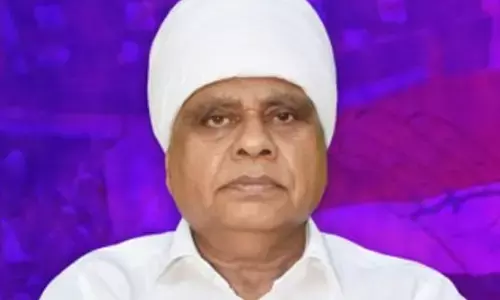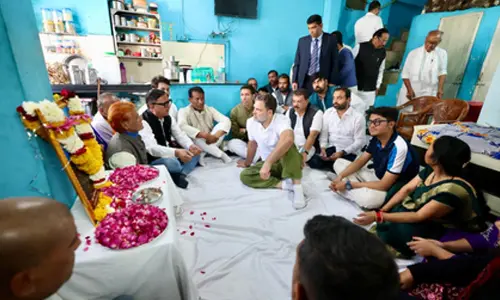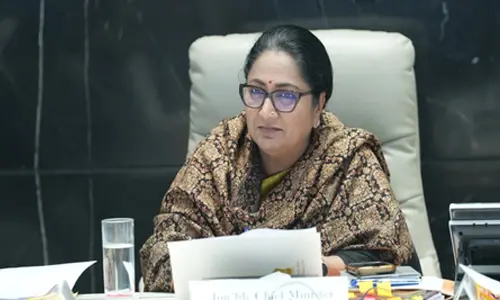Sundarayya � An inspiring revolutionary

 Communist stalwart Puchalapalli Sundarayya, whose 29th death anniversary is being observed on May 19, continues to inspire all stripes of communists because of his unshakeable beliefs and strong convictions that are reflected in his undying ideological legacy. He was known particularly for his exemplary devotion to the cause of the working class, selflessness, simplicity and sincerity in political life.
Communist stalwart Puchalapalli Sundarayya, whose 29th death anniversary is being observed on May 19, continues to inspire all stripes of communists because of his unshakeable beliefs and strong convictions that are reflected in his undying ideological legacy. He was known particularly for his exemplary devotion to the cause of the working class, selflessness, simplicity and sincerity in political life.
I had the unique opportunity to be closely associated with him in the last three years of his life; and more so, to be instrumental in bringing out his autobiography. We had several sittings for recording his life history, as told by him in a span of six months, wherein I could probe and understand him better. He stood mainly for three principles:
- The building up of a truly revolutionary party of the working class with good cadre, which is prepared to fight the exploiting class, both through parliamentary means as well as armed struggle, if required
- To build up the unity of working class and left forces
- To adhere to democratic centralism, keeping in view the multilingual, multicultural nature of our country, inside the party.
The three cardinal principles of Sundarayya are very much relevant even today to power the working class movement in the country.A "Comrade P S," as he is endearingly referred to, was one of the founder-members of the Communist Party in south India, especially in Andhra Pradesh. Perhaps no other leader in the Communist movement had the wide experience of both parliamentary and extra parliamentary struggles.
He was one of the leaders of the famous 'Heroic armed struggle' of the peasants of Telangana between 1946 and 1951. He had direct experience and knowledge of guerilla warfare. His special contribution was not only in leading the struggle but also in seeing to it that those guerilla squads come into mainstream after withdrawing the struggle. He arranged expert legal aid required and utilized his tenure as an MP to highlight the importance of class struggle.
With all this experience, he struggled within the united Communist Party for building a truly working class revolutionary party. He was worried that the united CPI was mainly confining itself to parliamentary ways and means with all its opportunistic pitfalls. After internal struggle for more than a decade, along with some other leaders, he came to the conclusion that there was no other way except to float another communist party. Thus, CPM was formed in 1964, for which Com PS was elected as all India general secretary.
Within three years of its formation a few of the CPM leaders of Naxalbari area, a division of West Bengal, thought that the armed struggle had to be taken up immediately as the path of Indian revolution and motivated the peasants of that area to take up arms in defense of their land. Com PS seriously opposed that 'Naxalite' path; not because he was against armed struggle as such, but because he felt that the party was not organized enough for it. He tried to persuade the Naxalite leaders to understand the importance of the organization for adopting a revolutionary party with secret underground outfits.
On the future of the naxalite movement, he wrote in his autobiography (1985) "Only future can tell whether it would be victorious or not, but I cannot take at face value all the claims of the victories of the movement". A While differing with the united CPI, since 1967 he had a feeling that the central leadership of CPI (M) had not been giving required attention to the organization of the party envisaged by them. He felt the consciousness of the working class movement of CPI (M) was being limited to economic consciousness, instead of developing a socialist consciousness.
The party organization was being built around parliamentary struggles only, gradually giving up the revolutionary notion that the interests of parliamentary struggle should be subordinated to class struggles outside. He had to fight internally with the central leadership of CPI(M) till 1975-76 when he came to the conclusion that he could no more bring about a change in their attitude. He then resigned as the general secretary and politburo member of CPI(M). Then he decided to move to Andhra Pradesh and try to build up the party the way he had wanted.
 The CPI(M) central leadership also, after vainly persuading Com PS to withdraw his papers, accepted his resignation without resorting to the blunder of taking disciplinary action against him. Com PS also decided to work within the CPI(M) since by then the party was committed to the same 1964 programme which had been accepted as a sequel to the 1951 'tactical line' adopted in the presence of Stalin. He did not float a new party, forcing another split in the Communist movement since he was a firm believer in the unity of left forces.
The CPI(M) central leadership also, after vainly persuading Com PS to withdraw his papers, accepted his resignation without resorting to the blunder of taking disciplinary action against him. Com PS also decided to work within the CPI(M) since by then the party was committed to the same 1964 programme which had been accepted as a sequel to the 1951 'tactical line' adopted in the presence of Stalin. He did not float a new party, forcing another split in the Communist movement since he was a firm believer in the unity of left forces.
Com PS always emphasized that the working class could never be victorious without unity. He argued against floating a separate trade union for sympathizers of CPI(M) since it would mean splitting the existing trade union CPI in RTC.A The CPI(M) would have had seat adjustments with the Telugu Desam Party of NTR in 1983 if Com PS were not to have strong conviction of the unity of left forces. He did not accept the proposal of NTR, since that he would mean adjustments of seats with CPI(M) alone, leaving aside CPI.
In spite of his serious differences with the Naxalites, Com PS forced the Government of AP to appoint the Bhargava Commission to enquire into false encounters against adventurist left groups by leading a delegation, along with late Sri Tenneti Viswanadham and other civil rights leaders, to then governor Sharada Mukherjee.
Com PS felt that the 'Democratic Centralism' as implemented by CPI(M) was distorted, leading to virtual centralism. He believed that the central party should keep for itself issues concerning foreign relations, country wide issues, inter-state problems etc. while leaving issues concerning states to the discretion of state units themselves. Today, the communists have sufficient experience of the damage done to the state party units due to centralization of powers.
Let us hope on this solemn occasion that all communist parties would further Com PS's crusade for the working class.










